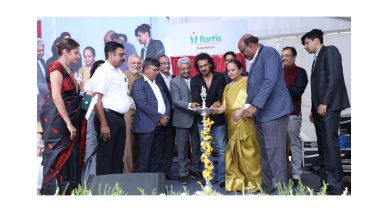KL Deemed-to-be University develops portable, handmade paper sensor to measure Vit D deficiency

The sensor is developed by designing a paper electrode
Koneru Lakshmaiah Education Foundation (KLEF) KL deemed-to-be University, a leading university in the country for graduation and higher education, has developed a unique handmade paper sensor that can measure Vitamin D deficiency with high accuracy. Developed by the team of Dr Pradeep Kumar Brahman, Department of Chemistry, KL Deemed-to-be University and Tummala Anusha, Research Scholar at the institute’s Andhra Pradesh campus, the sensor is for quick and reliable monitoring of Vit-D. The technology can lead smaller clinics, dispensaries in remote areas, medical facilities in geographically inaccessible locations, and smaller facilities to now measure Vitamin-D deficiencies without any bulky equipment or labs.
The sensor is developed by designing a paper electrode in a specific dimension and printing the patterned electrode on an A4 photocopy paper with a specially designed ink – Conductive Ink – that includes cobalt-silver doped copolymer-ionic liquid and acts as a sensor to detect Vitamin D deficiency. The strip, along with two common electrodes (Reference and Counter Electrodes) is then dipped in the patient’s serum sample containing electrolyte solution in a voltametric cell. An amperometric measurement is recorded at a constant potential. The obtained current corresponds to the level of Vit-D concentration. The 3 electrodes are connected to a Potentiostat, which is further connected to a monitor on which the lab technician can view the results of the vitamin D sensor.
The cost of this paper sensor will come to approximately Rs 40 to 50, whereas the cost of commercially available tests for Vitamin-D in hospitals and labs is around Rs 1500 to Rs 2000. The team at KL University has further tested the proof-of-concept with several real-life samples and concluded that the accuracy of this sensor is at over 94 per cent which is at par with the existing commercially available tests. The sensor produces results and generates the reports within 30 minutes, saving crucial time for diagnoses.
Koneru Satyanarayana, President, K L Deemed-to-be University said, “My compliment to all the faculty, staff and students for developing first-of-its-kind handmade paper sensor. We encourage our faculty, students, and department to actively participate in research projects in their interest areas. The university believes in facilitating and providing them with ample facilities and a conducive research environment to come out with path-breaking innovative ideas.”
Dr Pradeep Kumar Brahman, Dept of Chemistry, KL Deemed-to-be University, “This is possibly the first-of-its-kind and the most affordable Vitamin D deficiency sensor in national and international markets. It will make Vitamin D deficiency testing affordable for cost-conscious countries like India. We took two years to finish the research and come up with this pioneering product. This handmade sensor is accurate and reliable for the monitoring of vitamin D deficiency in remote areas where limited resources are available.”
“We are grateful to KL University for providing us with resources that made our work easier. We hope that the product reaches remote areas where Vit-D testing is crucial but unaffordable,” added Tummala Anusha, Research Scholar, KL Deemed-to-be University who worked on the project.
Commenting on the new technical solution, Dr GP Saradhi Varma, In-Charge Vice-Chancellor, KL Deemed to be University said, “It pleases me to see that our research faculty are making such innovative advancements and contributing to the field of medical science. Vitamin D deficiency is a crucial factor to address to prevent our nation from becoming a vitamin D deficient population.”




